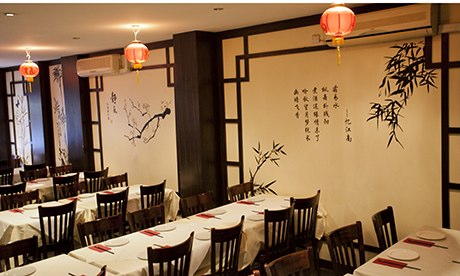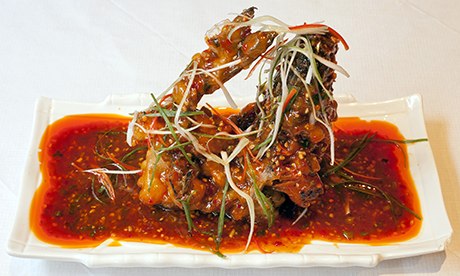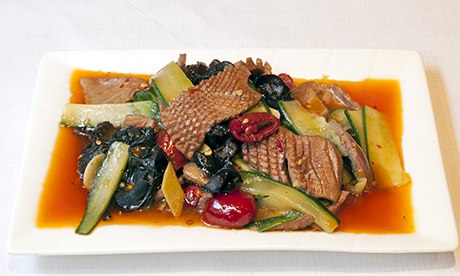
Get it while it’s hot: the ‘cosy’ dining room of Sichuan Folk, in London’s Shoreditch. Photograph: Sophia Evans for the Observer
32 Hanbury Street, London E1 (020 7247 4735). Meal for two: £70 (cash only)
A few years ago I gave a positive review to a Chinese restaurant on London’s Shaftesbury Avenue called Golden Day, where the food made my scalp sweat. It specialised in the dishes of Hunan; nothing could be served unless it had first been pelted with fistfuls of fresh and dried chillies, even dessert. I loved their “dry pot” chicken, the liquor in the wok bubbling to nothing over its burner, and the slices of pork belly with pickled soya beans. The management laminated my review and stuck it in the window. I walk past often and, being thus reminded of what a great time I’d had there, would pop in by myself, hunker down behind one of the wooden partitions and bury myself armpit deep in plates of fire and punch with a bit of pig thrown in for good measure. It made me happy.
A few months back I ate there again and it was awful. It was now a culinary black hole, a place where appetite went to die. It felt like a different place entirely. Dreary bits of meat floundered about like corpulent German tourists testing the buoyancy of the Dead Sea, in sauces which had a similar level of subtlety as those waters. I told the manager how bad I thought it now was and walked him over to the window where the laminated copy of my review was Blu-Tacked in place. I insisted he took it down, which he did. It was a staggeringly self-regarding thing to do: bullying, bombastic and ludicrous. In my defence, I was really quite drunk, which is no defence at all. Then again I was also very cross.
I’ve since realised my sense that this was now a different restaurant was closer to the mark than I might have imagined. Not long after, I heard that the Golden Day chef had moved on to Yipin China on the Essex Road. I ate there and lo and behold all the power and attitude I loved was in place. This is something with which those of us who adore these niche Chinese restaurants, with their fighty repertoire far removed from the sugary staples of the Cantonese tradition, must contend. The kitchens of restaurants serving the food of Sichuan, Hunan and Xiandong provinces depend, for the most part, on an immigrant workforce. And that workforce tends to be more mobile than most. The restaurant is great until they sod off somewhere else. Then it isn’t. I am constantly receiving emails from people telling me the place I praised is awful, that I am an idiot and have personally ruined their evening out. (The exception to this is the group around the Soho Sichuan restaurant Barshu, which maintains its standards.)
I hope today’s restaurant stays as good as it was the night I ate there, but past experience means I advise you to visit sooner rather than later. Sichuan Folk was recommended to me by the brilliant Fuchsia Dunlop, author of the key English language cookery books on Sichuan food, who also trained at the Sichuan Higher Institute of Cuisine in Chengdu, one of the very first Europeans so to do. She is a consultant for the Barshu group, and regularly rolls her eyes at me when I big up the qualities of a rival, as if I’m a promising undergraduate who has overreached himself. So if she recommends somewhere it’s generally worth paying attention.
And it is. Sichuan Folk is a small box of a restaurant on Brick Lane, down the road from the many truly awful curry houses which cluster here. There is a little wooden fretwork on the walls and some brushwork – Chinese characters, a few delicate bamboo shoots – for decoration. Tables are packed closely together, so that you end up pointing at dishes landing in front of strangers and barking: “Ooh, what’s that?” As is standard in Sichuan places, the menu is picture led. It is a riot of overexposed saturated colours – or at least I assumed it was until the food arrived and it was just as vivid off the page.
We started with a bowl of sesame seed-sprinkled caramelised walnuts, as black as pebbles on a churned shingle beach and almost as shiny. These are the crystal meth of sugared-nut snacks, the thin outer layer giving way to deep toasted tones punched up by the sesame seeds. They are what Tsingtao beer was invented for.

Jay Rayner: ‘We fear bones, but the whole fish can be crunched through from head to tail’: (pictured) the sea bass in question. Photograph: Sophia Evans for the Observer
Their meaty, thin-skinned “signature” dumplings are half the size of standard Chinese-restaurant offerings and come in a deep soy-based sauce which is less a salty hit than something intense with umami and more caramel. Our waiter insists on spooning the sauce over the dumpling’s folds repeatedly before he will let us near them. We appreciate his ministrations.
Sichuan twice-cooked pork is slices of belly with fat the colour of marble that melts on the tongue, with a good handful of seared spring onions to make you feel it might almost be good for you, plus the welcome intrusion of pickled red chillies. It’s served with steamed rice buns to be opened up and back-filled: you get soft sweet bun, the crunch of spring onion, the hit of fiery sauce and then the pork itself.
Fire-exploded kidney flowers is perhaps a little less pyrotechnic than it sounds – it’s a stir-fry of sliced pig’s kidney but is as gloriously unapologetic a piece of offal cookery as you will find in London.

Jay Rayner: ‘Fire-exploded kidney flowers is less pyrotechnic than it sounds – it’s a stir-fry of sliced pig’s kidney’ (pictured). Photograph: Sophia Evans for the Observer
The final combo is Chinese fish and chips. The chips are slices of flash-fried potato with a shedload of dried red chillies, garlic and salt. What’s not to like? The fish is a “fish-fragrant” sea bass that arrives at the table whole, battered and curling up on itself, slathered with a sauce and a fine julienne of spring onions. The waiter displays then dismantles it. We fear bones, but by some miracle of expert deep-frying, the whole thing can be crunched through from head to tail. The flesh is white and pearly and soft. The sauce is sweet and sticky, with an edge of fire.
That’s a repeated theme. Some Sichuan restaurants throw chillies and numbing peppercorns at you as if you’re an addict craving a fix (and sometimes I am). Perhaps we only hit the gentle end of the menu, but here it felt like they were being used as a flavouring rather than some sweat-inducing declaration of intent.
Right now Sichuan Folk is an absolute gem, a true collector’s piece. I just hope it stays that way.
■ The Red Chilli group has been a reliable source of kicking Sichuan food across the north for many years now. The most reliable remains the outpost on Portland Street, in Manchester. Portions are huge, and prices reasonable. Ignore any dish you’ve ever heard of and go instead for the likes of spicy hot-poached mutton in chilli oil. Some of it may hurt, but you’ll like it…
■ While we’re in that part of the world, Disappearing Dining Clubs, which stages pop-up dinners in unusual locations, has just extended operations from London to Mancs. The next one is on 28 November in Murray’s Mills, Ancoats. Four courses cost £46 with £1 going to the Teenage Cancer Trust (disappearingdiningclub.co.uk)
■ This week sees the publication of A Fork In The Road, a collection of food-based travel writing from the Lonely Planet, edited by James Oseland of American food mag Saveur. There are contributions from big names such as Michael Pollan, Tamasin Day-Lewis and Fuchsia Dunlop…. Oh, and an essay on the joys of Essex oysters by, er, me.
Email Jay at jay.rayner@observer.co.uk. Follow Jay on Twitter @jayrayner1
YOUR COMMENT